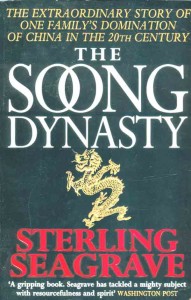 Chinese philosophy and business practices have long influenced Southeast Asia. Here at WoWasis, we found the following books to be especially compelling for Westerners, as the information in the books on this list, while particular to China, helps to explain much about life in Southeast Asia. We’ve grouped them into Nonfiction and Fiction categories.
Chinese philosophy and business practices have long influenced Southeast Asia. Here at WoWasis, we found the following books to be especially compelling for Westerners, as the information in the books on this list, while particular to China, helps to explain much about life in Southeast Asia. We’ve grouped them into Nonfiction and Fiction categories.
Nonfiction books on China
Sterling Seagrave’s The Soong Dynasty (1985, ISBN 0-552-14108-9) is indispensable for anyone wishing to understand 20th century history as it pertains to China, Taiwan, Southeast Asia, and even the United States. As Seagrave describes, the Soong family which included notables such as Sun Yat-sen, Chiang Kai-shek, and Madame Chiang Kai-shek, controlled a significant percentage of the political and business action occurring in Asia in the past century. Even today, the Kuomintang (KMT) of Chiang maintains control of much of the business activity of Southeast Asia’s Golden Triangle. Among the topics discussed in this fascinating book is the heroin trade, the history of the triads, the link to triads in San Francisco, the ascension of Chiang, and a female secret society charged with assassinating men. Seagrave is a historical writer with a flair for story-telling, making this 500-plus page book a pleasurable read. Buy it now at the WoWasis estore, powered by Amazon.
Whether you’re thinking of starting a business in China, or already have had the pleasure of that experience, Tim Clissold’s Mr. China (2004, ISBN 1-84119-788-2) is a must-read. The author, along with a group of US-based investors, managed to lose over $400 million in the space of a few months. Self-effacing and engaging, Clissold describes the never-ending series of trials, tribulations, and interactions involving various Chinese governmental officials, factory directors, and workers’ groups. On the way, he provides an interesting explanation of the Mandarin tongue, the Tsingtao stock market scandal, and other fascinating stories.
Author Lee Feigon makes a strong case for re-evaluating the Maoist years in Mao: a Reinterpretation (2002, ISBN 1-56663-522-5). Here, Feigon investigates the Great Leap Forward, the Cultural Revolution, Sino-Soviet relations, and delves into the political relationships between Mao and Chinese and Soviet leaders. One of the more fascinating elements in the book is Mao’s philosophy for embracing the opposition, a decided break from the contemporary Stalinist philosophy endemic to many of the Soviet Bloc countries of the era.
Fiction books on China
Many agree that novelist Jack Reynolds’ Woman of Bangkok is the book that initiated the “Bangkok Fiction” school of writing. In 1974, Reynolds published a wonderful collection of essays, interpreting his days as an ambulance driver and medic in post WWII China, Daughters of an Ancient Race (Heinemann Educational Books, no ISBN). He makes keen observations on the human character, women, and Communist and KMT politics and culture. Perhaps the most astonishing story is “A Bath Could Kill You,” describing the reasons an entire village would go without bathing, and its olfactory effect on the author.
Novelist Paul Theroux unveils the climate of the handover of Hong Kong, using the metaphor of an old business in the uncomfortable position of having to change hands, in Kowloon Tong; a Novel of Hong Kong (1997, ISBN 0-140-26645-3.) Theroux’s protagonist — to use the term loosely — is an old fashioned mama’s boy unable to understand the forces that have taken hold of his life, and what’s left of his company. Along the way, there are plenty of interesting takes on the bar girl world: “the beauty of being with bar girls as that you never told them the truth, because they did not care what you said.” Buy it now at the WoWasis estore, powered by Amazon.
Su Tong is an acclaimed writer whose novella ‘Wives and Concubines’ was made into the feature film Raise the Red Lantern. Under the latter title was a book consisting of two other novellas (1993, ISBN 0-14-02-6030), containing rich descriptions of village life in the traditional world of China, great plot lines, and exceptional character development.
Leave a Reply